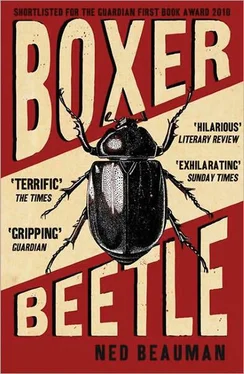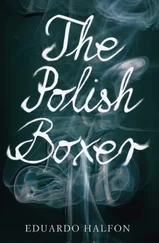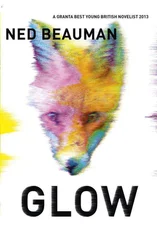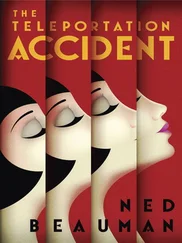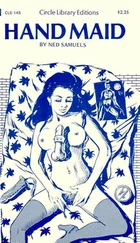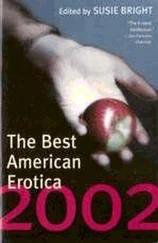‘Now, I must introduce you to Signor Amadeo,’ said the feminoid parody.
Amadeo smiled and stuck out his right hand so that his arm was exactly perpendicular to his body. Erskine awkwardly shook it, momentarily dazzled by the bright August sunshine gleaming off the Italian’s steel button. ‘A great pleasure to make your acquaintance,’ said Amadeo.
‘Signor Amadeo very much wants to see all the contraptions downstairs — why don’t you show him?’
‘All right,’ said Erskine. ‘Take my bags upstairs, please,’ he said to Sinner. Nowhere in the luggage was Anophthalmus hitleri ; he had decided it would be better to leave the tuck box safely in the flat, stuffed with enough chicken bones to last the hungry beetles a month.
‘Go inside and ask for Godwin,’ added his mother. ‘He’ll show you Philip’s bedroom, and everything else. I’m afraid the luggage lifts have broken down again.’
Sinner went inside with the suitcases, leaving only the precious valise containing the bowdlerised second draft of the history of Pangaean. Erskine picked this up before going downstairs with Amadeo, who he now remembered was one of the lesser Italian Futurists. Like many others in the movement, Amadeo had called for a war to reinvigorate Europe. After war did obligingly arrive, most of his colleagues, who had not expected to get what they wanted quite so quickly, started to call for other, different things, but Amadeo just called for more war — longer, bloodier, and even more thoroughly mechanised. He thought of himself, in fact, as the most dedicated of all the Futurists, because he had not altered a single one of his aesthetic or political positions in over two decades, leaving them proudly in place like the machines of Claramore. At fifty years old he still wouldn’t eat pasta, he still used an alternative punctuation system of his own invention, he still had all his clothes made at the only ‘dynamic’ tailor left in Milan, he still fed poison to seagulls, and he still occasionally shampooed with engine oil. Like many of the speakers at the conference that summer, he had few friends.
They moved on from the vacuum pump to the hydro-extractor. ‘Its shining industrial vectors recapitulate the perfect curves of a woman’s thigh,’ said Amadeo, and then sighed wistfully. Erskine decided to leave him to it. He still hadn’t seen his father and he knew he had better get that over with. But on the way to his father’s study he heard jarring piano chords and went into the drawing room.
‘Hello, Phippy,’ said Evelyn. ‘I must admit I’m almost pleased to see you.’
‘Same to you.’
‘I notice you brought your “valet” or whatever he is.’
‘Yes. Are you composing?’ Erskine knew that his sister had only seized upon ‘atonal music’ (whatever that meant) as a way of disconcerting their parents, and he also knew that it wouldn’t work — even their father wouldn’t be dense enough to believe that she really liked all that rot, most of which sounded like something a sadistic dentist would pipe into his waiting room to frighten his patients. Alistair Thurlow, who supposedly knew all about these things, had claimed that Evelyn’s compositions displayed ‘so much potential it’s rather staggering’, and had tried to persuade Erskine’s parents to send her to an academy of some kind, but Erskine felt sure he was just being polite.
‘No. Practising. I can’t get anything done when I’m cooped up in this house.’
‘Go for a walk, then.’
‘That’s no use at all,’ said Evelyn obscurely.
Before Erskine could ask her what she meant, a red-haired girl of about twelve years old burst into the room and shouted, ‘Mr Erskine, I have just seen your friend Mr Morton brutally sodomising your dear mother!’ Erskine was taken aback for a moment before he realised that the girl was Millicent Bruiseland and this was quite normal. Millicent’s mother, apparently as a devious mode of retribution in some feud with her husband, had sent their insufferably precocious daughter to a Finnish psychiatrist who had packed her head with words she still only dimly understood, and the girl was now in the habit of making accusations like this one. Her parents were confident that she would soon grow out of it as long as nobody paid her any attention.
Evelyn said, ‘Go away and write your novel, Milly.’ Millicent tutted and went out. ‘I really don’t understand why anyone is interested in children,’ she added.
‘No.’ Then Erskine looked up. ‘Wait a minute, is Morton actually here? Was that much true?’
‘Yes.’
‘My God, of all the blasted people,’ said Erskine. ‘Why?’
‘Well, Mosley’s not coming — not that anyone but Father ever really thought he would — and Bruiseland insisted that there be some representation from the Blackshirts.’
‘Then why Morton? He’s not much of a “representation”. As far as I know he’s only vaguely associated with that gang.’
‘It also happens that Julius and I have become engaged,’ said Evelyn, not meeting his eyes but staring past him at the atrocious green wallpaper.
‘Are you joking?’
‘No.’
‘When?’
‘Last week.’
‘Evelyn, for heaven’s sake, you don’t even know the man.’
‘Yes, I do. And we’re both from good healthy stock. Isn’t that all you care about?’
‘I do have some concern for your wellbeing, sister.’
Then their mother came in clutching a flower pot.
‘Angels, go upstairs and pay a visit to Casper Bruiseland. He’s up in the observatory and I’m sure he’d be pleased to see you both.’
Philip and Evelyn began a shrill duet of protest. Their mother was too busy to argue so she said, ‘All right, all right, Casper can wait. But your father can’t, Philip.’
‘Where is he?’
‘In the library. Off you go.’
Erskine did as he was told. The door to the library was closed. As he reached for the handle he heard voices inside, and paused. One voice was his father’s and the other was Leonard Bruiseland’s. He pressed his ear to the wood. He had always loved eavesdropping.
‘How many letters have you got from this thug?’ said Erskine’s father.
‘Just one,’ said Bruiseland.
‘Did you recognise the handwriting?’
‘No. Did you?’
‘No. I think it was deliberately disguised.’
‘Probably.’
‘And it contained the same threats?’
‘Yes,’ said Bruiseland. ‘It’s very alarming.’
‘It’s not alarming. Any fool can write a nasty letter.’
‘We’ll see.’
Erskine heard muffled footsteps and backed away from the door of the library just before it was flung open.
‘Aha, the Erskine boy!’ said Bruiseland. He was a cheerful muscular man with a peeling red nose who would often, mid-sentence, perform a totally unselfconscious symphony of snorting, barking and choking sounds to dislodge some particle from his sinuses. ‘How is our young scientist?’ Bruiseland, devoted to his three farms, disliked most scientists, but he liked Erskine because Erskine studied what Bruiseland understood to be a sort of advanced branch of animal husbandry.
‘Very well, thank you.’
‘You’re mostly in London nowadays?’
‘Yes.’
‘You’ll snargh snargh hargh snargh soon grow out of that, I’m sure. And, er, how is your sister?’ said Bruiseland, his broad smile shifting to a look of apprehension.
‘She’s recently engaged,’ said Erskine, discreetly wiping spittle from his forehead.
‘Oh.’ To Bruiseland, Evelyn Erskine was an object of profound terror. Since most of his stereotypes were at least fifteen years out of date, he placed her somewhere between the opium-smoking flapper and the Ibsen woman who instead of children has ‘soul-conflict’. He felt sure that her unlucky future husband would discover on her naked body the wounds of at least three (apparently contradictory) sexual tendencies, each on its own enough to prevent her from ever giving him a healthy heir: the bruised pustulent genitals of a dizzy aristocratic whore; the sinister buttock tattoos of a lesbian cultist; and the pancake breasts of a neurotic Modernist androgyne. Her sarcasm, her impetuousness, her music, her (presumed) sexual degeneracy and half a dozen other terrible qualities made her, to Bruiseland, not only a summary of everything that was wrong with post-suffrage women, but also a culprit in the decay of his own marriage. He didn’t believed that his wife would ever have thought of sending their daughter to that Finnish amoralist, for instance, without a bit of a push from Evelyn Erskine and her comrades, nor would she have thought of running off to Florence to spend all his money. Still, he acknowledged that ultimately the nobility of England had no one but themselves to blame for the condition of their wives and daughters — no one but themselves, foreigners, and the free press.
Читать дальше
